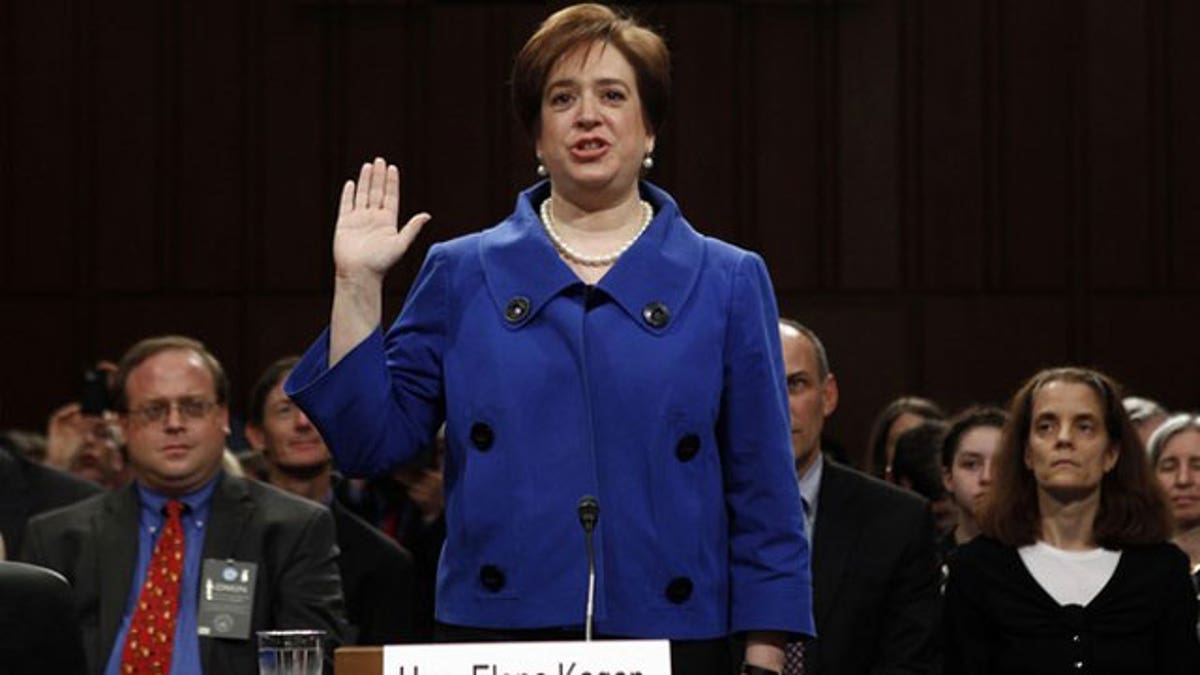
June 28: U.S. Supreme Court nominee Elena Kagan is sworn in to testify during the first day of her Senate Judiciary Committee confirmation hearings on Capitol Hill in Washington (Reuters).
Supreme Court nominee Elena Kagan pledged on Monday to do her best to consider "every case impartially, modestly, with commitment to principle and in accordance with law" if appointed to the nation's highest court.
Speaking on the first day of her confirmation hearing before the Senate Judiciary Committee, Kagan said the court must ensure that "our government never oversteps its proper bounds or violates the rights of individuals."
"But the court must also recognize the limits on itself and respect the choices made by the American people," she said, adding that her past work in government public service has shown her that, in her words, "no one has a monopoly on truth and wisdom."
"I will make no pledges this week other than this one -- that if confirmed, I will remember and abide by all these lessons," she said. "I will listen hard, to every party before the court and to each of my colleagues."
Kagan's opening testimony marked the beginning of a marathon high-pressure vetting by the committee, in which members will scrutinize her record. Her remarks also came after the GOP, including the top Republican on the Senate Judiciary Committee, voiced concerns over the 50-year-old solicitor general, telling the panel that her career has been "consumed more by politics than law."
Sen. Jeff Sessions, R-Ala., ranking Republican on the panel, said Kagan's record warrants close questioning as the Senate considers her appointment to the nation's highest court.
"Ms. Kagan certainly has numerous talents and good qualities, but there are serious concerns about this nomination," he said.
Sessions noted that Kagan has "never tried a case before a jury" and "has associated herself with well-known activist judges." He also maintained that she broke the law in denying military recruiters access to students at Harvard Law School, where she served as dean.
Sen. Lindsey Graham, R-S.C., called some of the nominee's past actions and writings "a bit disturbing," and said that Kagan's temporary ban on military recruiting at Harvard was "inappropriate." Graham, however, said Kagan's nomination wouldn't change the balance of power on the court.
The Democrats, meanwhile, including chairman Sen. Patrick Leahy of Vermont, lauded the 50-year-old solicitor general as a moderate and mainstream legal scholar.
"I believe the fair-minded people will find her philosophy well within the legal mainstream," Leahy said. "I welcome questions but urge senators on both sides to be fair. No one should presume that this intelligent woman who has excelled during every part of her varied and distinguished career, lacks independence."
Sen. Dianne Feinstein, D-Calif., said Kagan had a "sterling reputation" and was "unquestionably qualified" to serve on the Supreme Court, calling her lack of judicial experience "refreshing." And Sen. Charles Schumer, D-N.Y., said he's confident Kagan will bring "both moderation and pragmatism" to the high court.
"You represent the best this country has to offer," Schumer said of Kagan.
Obama nominated Kagan to succeed retiring Justice John Paul Stevens, a frequent dissenter in a string of 5-4 rulings handed down by a conservative majority under Chief Justice John Roberts.
Kagan's chances are bright as she begins the weeklong hearing, pressing to portray herself as a mainstream, impartial addition to the court.
Democrats have more than enough votes to confirm her. Republicans have shown no inclination to try to block such a vote, although some conservative interest groups are urging them in increasingly vocal ways to do so.
The GOP is expected to grill Kagan on hot-button issues from guns to abortion to campaign finance, arguing that she'd bring liberal politics and an anti-military bias to the job of a justice.
Graham and other Republicans have cited several concerns, including her actions as a dean to restrict military recruiters on Harvard's campus and her stated admiration for liberal Israeli judge Aharon Barak, former president of Israel's Supreme Court.
But Kagan's supporters said the smoking gun just isn't there. Before her nomination was announced, she was considered one of the least controversial potential picks, and Democrats said her would-be critics have been struggling ever since.
"It feels like we have an opposition in search of a rationale," White House senior adviser David Axelrod said on a conference call Friday.
Much attention has been focused on her work in the 1990s as a mid-level Clinton administration staffer in the White House and from her earlier yearlong clerkship for Justice Thurgood Marshall. One item that will likely come up is a 1995 article in which she described Supreme Court hearings as a "vapid and hollow charade."
Some Republicans have expressed concerns that Kagan would become a judicial activist along the lines of Marshall. Confirmed in 1967 as the first black justice in history, he was a civil rights lawyer best known in his earlier career for successfully arguing the case in which the Supreme Court ruled that segregation of public schools along racial lines was unconstitutional. As a young lawyer, Kagan was one of his clerks at the high court.
Feinstein said her record is what matters most.
"This is a very impressive record, and that's what we judge people on -- not that she said this one time or that one time," she said.
Leahy echoed that point, saying the charges against Kagan have been made in a "vacuum" because the nominee has not had a chance to answer.
The Associated Press contributed to this report




